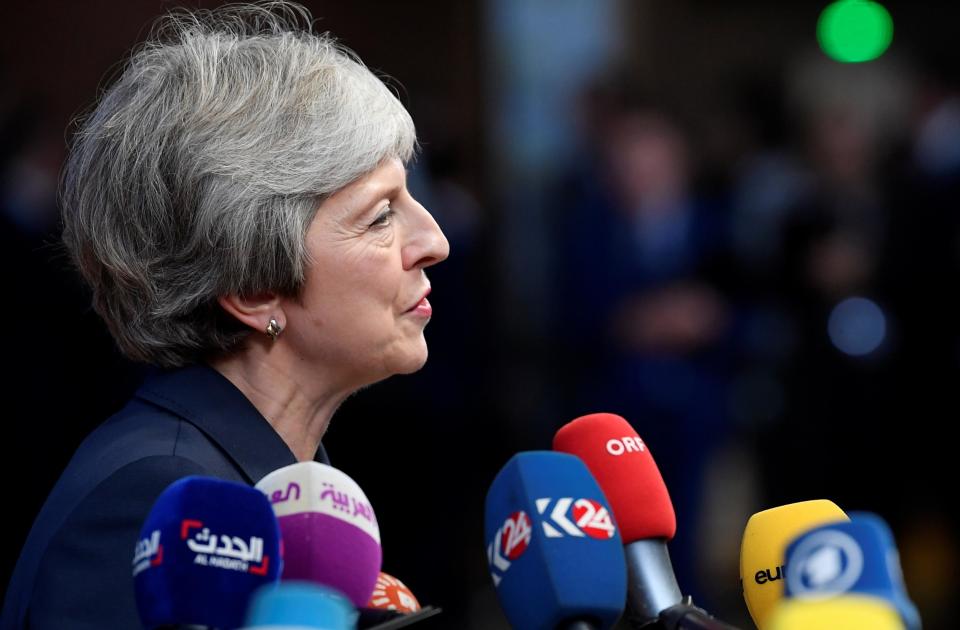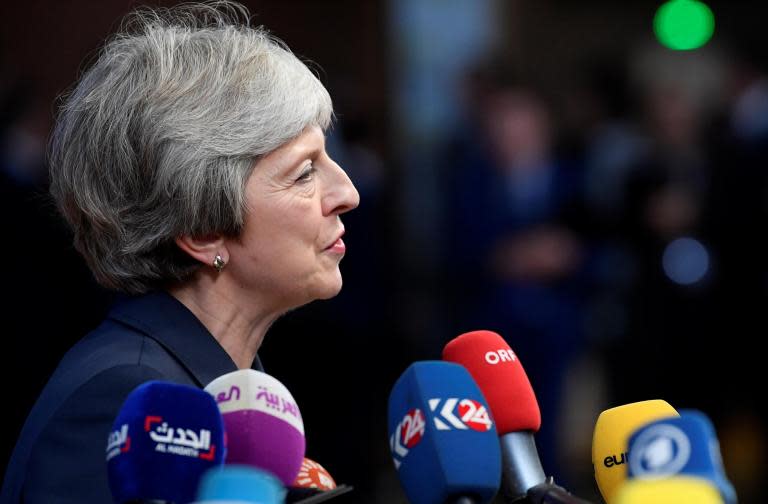Theresa May opens door to longer Brexit transition period
Theresa May has opened the door to an even longer Brexit transition period, setting herself on yet another collision course with Tory Eurosceptics and potentially growing the EU divorce bill by billions.
The prime minister brought up the possibility of an extension during meetings with EU leaders in Brussels on Wednesday as she sought to find a way to break the deadlock in negotiations.
The period – during which the UK would stay completely tied to EU rules without any say on them – is hugely unpopular with Brexiteers, who believe it would make Britain a “vassal state” of the bloc.
European Parliament president Antonio Tajani, who was in the room while Ms May spoke with leaders, said the prime minister had listed a longer transition as a possible solution to the current impasse.
“It was mentioned – both sides mentioned the idea of an extension of a transition period as one possibility that is on the table and would be looked into,” Mr Tajani told reporters after Ms May’s address.
“Theresa May during her speech said it’s possible to achieve an agreement also on a transition period, but not with a clear position on the timing.”
With a smile, he added: “This Council is the transition Council.”
Both sides mentioned the idea of an extension of a transition period as one possibility that is one the table and would be looked into
Antonio Tajani, European Parliament president
The prime minister is also understood to have brought up an extension to the period in a private bilateral meeting with Council president Donald Tusk earlier in the afternoon.
One Brussels official told The Independent that the UK’s negotiators had been sounding out a possible extension to the transition “for months” in talks.
The prime minister herself had hours earlier failed to rule out a longer transition when asked about it by reporters as she arrived at the summit – avoiding touching on the issue entirely in her answer.
The Independent understands that the UK has previously been reticent to sign up to a longer transition because of the extra costs that would be involved. The EU has said the UK would have to keep paying into the bloc’s budget during any extension – reopening discussions about the “divorce bill”.
It would also complicate talks because the UK would have to participate in the EU’s next budget cycle, which begins the day after the existing 21-month transition is set to end.
An EU source told The Independent that the UK’s response to the offer of a longer period, made during last week’s aborted talks, was that the “financial implications would be complicated”.
Trade experts and many in Brussels have longed believed that the existing 21 months would be nowhere near enough to negotiate a trade deal, and that an extension is inevitable.
Senior UK government officials travelling with the PM to the summit also dodged the question when asked if they were set against a longer transition.
“Our position is as it was, which is that the implementation period has an end date and we are not proposing to change that,” one senior British official said. They later added that the government was not ruling an extension out, however.
Speaking at a press conference, Parliament president Mr Tajani recounting his meeting with Ms May, said: “I underlined that for the European Parliament, to have three years is a good solution.
“May, speaking [listing] different solutions, said also that there are proposals on the transition period. Not against, but more or less neutral.”
Speaking to EU leaders behind closed doors, the prime minister is understood to have said: “We’ve shown we can do difficult deals together constructively. I remain confident of a good outcome. The last stage will need courage, trust and leadership on both sides.”
The PM addressed EU leaders before they departed to have dinner, in a separate room to her. She then retired to the British Residence in Brussels for a dinner with her team while the 27 leaders ate together and heard from chief negotiator Michel Barnier about talks.
The leaders are expected to confirm on Thursday whether or not they will hold a special summit in November to finalise a Brexit deal, or whether there is no point. Arriving at the summit on Wednesday Mr Barnier said he needed “much more time” to conclude an agreement.

 Yahoo News
Yahoo News 

